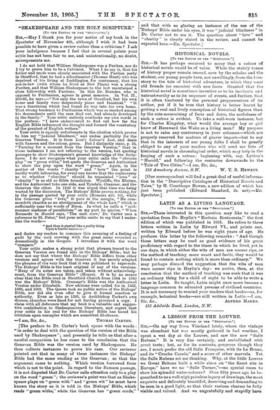LATIN AS A LIVING LANGUAGE.
SrE,—Those interested in this question may like to read a quotation from Dr. Heylin's " Ecclesia. Restaurata," the first edition of which was published in 1661. He refers to three letters written in Latin by Edward VI., and prints one, written by Edward before he was eight years of age. He prefaces this letter by the following remarks : "And though these letters may be used as good evidence of his great proficiency with regard to the times in which he lived, yet in our days, in which either the wits of men are sooner ripe, or the method of teaching more exact and facile, they would be found to contain nothing which is more than ordinary." We may perhaps discard the suggestion that the wits of men were sooner ripe in Heylin's day: we arrive, then, at • the conclusion that the method of teaching was such that it was an ordinary thing for a child of eight to be able to write a letter in Latin. So taught, Latin might once more become a language common to educated persons of civilised countries. It is not necessary to remind your readers that books—as, for example, botanical books—are still written in Latin.—I am,


































































 Previous page
Previous page